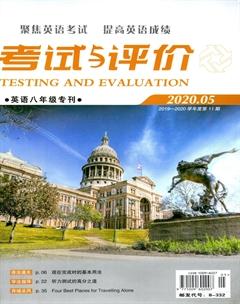现在完成时态易混点聚焦
曲梁
一、have been to / have gone to / have been in的用法比较
1. have been to意思是“到过,去过”,表示曾经到过某处,但现在人不在那儿。
I have been to Guilin. I went there last year. 我去过桂林,我去年去的。
2. have gone to意思是“去了”,表示已经去了某地,现在人可能在去的途中或已在那儿了。
She has gone to Nanjing. 她已經去南京了。
3. have been in意思是“呆在某处一段时间了”。
You have never been there, have you? 你以前从未去过那儿,是吗?
二、巧学妙记:同一个意思有四种不同的表达方式
我买这块手表20年了。
I have had this watch for 20 years. (这个句型叫代替法:用一个延续性动词的现在完成时代替终止性动词,然后用“for+一段时间”句型结构)
I bought this watch 20 years ago. (这个句型叫ago法:是用“终止性动词的一般过去式+一段时间+ago”)
It is 20 years since I bought this watch. (这个句型叫强调法:It is+一段时间+since+从句)
Twenty years has passed since I bought this watch. (这个句型叫 passed法:一段时间+ has passed+since+从句)
三、现在完成时与一般过去时的用法比较
1. 一般过去时表示过去某时发生的动作或单纯叙述过去的事情,强调动作;现在完成时为过去发生的,强调过去的事情对现在的影响,强调的是影响。
I saw this film yesterday. (强调动作发生的时间是yesterday)
I have seen this film. (强调对现在的影响,电影的内容已经知道了)
2. 一般过去时和表示过去的时间状语连用,如:...ago, in 2018, in the past, yesterday,then, that day, one day, once (从前), last week / month / year / night / Monday 等。
3. 现在完成时常和recently (近来), ever, never, twice, so far (到目前为止), since, for, in the past / last few years, already (肯定句), yet (否定、疑问句), just (刚刚), before (以前)等连用。
【牛刀小试】
一、单项选择。
1. —Do you know him well?
—Sure. We ___ friends since ten years ago.
A. were B. have been
C. have become D. have made
2. He has ___ been to Shanghai, has he?
A. already B. never C. ever D. still
3. Hurry up! The play ___ for ten minutes.
A. has begun B. had begun
C. has been on D. began
4. It ___ ten years since he left the army.
A. is B. has C. will D. was
5. Miss Brown isn't in the office. She ___ to the library.
A. has gone B. went
C. will go D. has been
6. We ___ Xiao Qu since she was a little girl.
A. know B. had known
C. have known D. knew
7. Harry Potter is a very nice film. I ___ twice.
A. will see B have seen
C. saw D. see
8. —These farmers have been to the United States.
—Really? When ___ there?
A. will they go B. did they go
C. do they go D. have they gone
9. Kate ___ already ___ in this school for two years.
A. was; studying B. will; study
C. has; studied D. are; studying
10. His father ___ the Party since 1998.
A. joined B. has joined
C. was in D. has been in
11. It ___ ten years since he left the army.
A. is B. has
C. will D. was
12. My parents ___ Dandong for ten years.
A. have been in B. have been to
C. have gone to D. have been
13. The students have cleaned the classroom,___?
A. so they B. don't they
C. have they D. haven't they
14. ___ has Mr. Green been a member of Greener China since he ___ to China?
A. How soon; comes
B. How often; got
C. How long; came
D. How far; arrived
15. —Look! Someone ___ the classroom.
—Well, it wasn't me. I didn't do it.
A. is cleaning B. was cleaning
C. has cleaned D. will clean
二、根据汉语意思完成英语句子,每空一词。
1. 戴安娜已经离开家乡十年了,她希望尽快回来。
Diana ___ ___ ___ ___ her hometown for ten years and she hopes to come back ___ ___ ___ possible.
2. 自从来到无锡,我们学校的外教已经习惯了这里的生活。
The foreign teacher in our school ___ ___ ___ ___ ___ ___ here since he came to Wuxi.
3. 自我开始学英语以来,我结识了很多外国朋友。
I have made many foreign friends ___ I ___ learning English.
4. 他們已经采取行动挽救野生动物了吗?
Have they ___ ___ to save wild animals yet?
5. 《复仇者联盟4》已经上映两个月了。
Avengers: Endgame ___ ___ ___ for two months.
三、将下列句子翻译成英语。
1. 这位法国医生已经在中国工作十多年了。
_________________
2. 我们曾经去过上海。
_________________
3. 我还没学会怎样使用这部手机。
_________________
4. 你从北京回来多久了?
_________________
5. 这部手机他已经买两年了。
_________________

